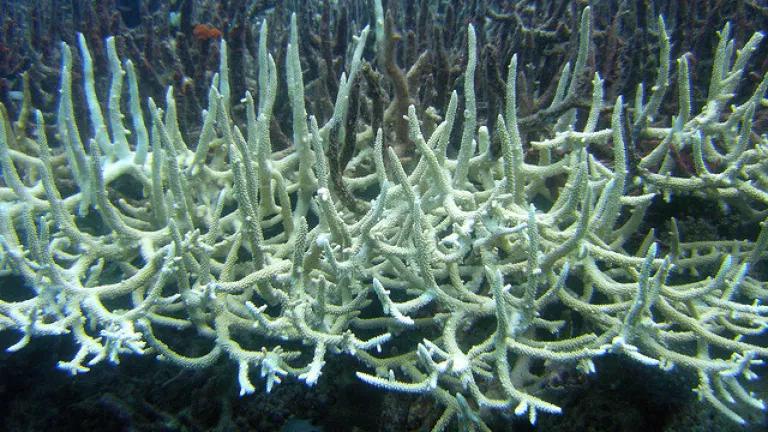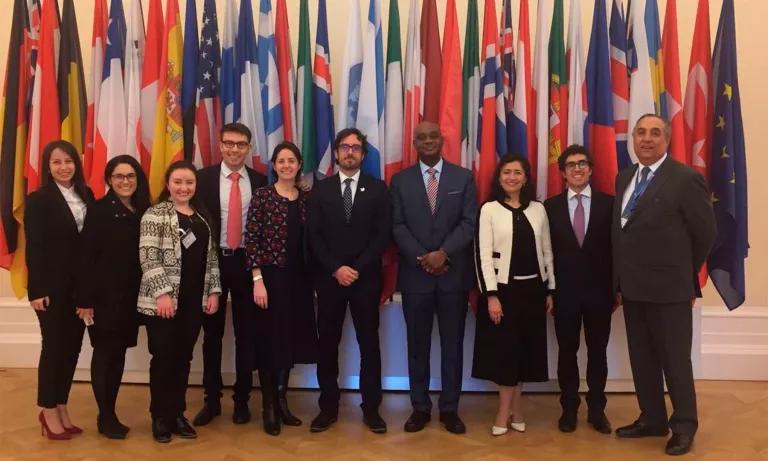
Colombian Sustainable Fund officially launches, campaign to protect Chilean Patagonia’s seas, Mexico’s stellar second energy auction
To get the weekly Latin America Green News blog delivered directly to your email, subscribe here.
February 2 – 9, 2017
Climate Change
Due to their deep underwater presence, it is easy to forget the delicate nature of coral reefs. At a time when oceans are acidifying and warming, coral reefs are one the most imperiled species in the world. The staghorn coral, endemic to the southern Gulf of Mexico, Florida, and the Caribbean, in particular, has experienced disastrous declines of up to 98 percent since the 1980s. The International Union for Conservation of Nature (IUCN) has placed the staghorn coral in the “critically endangered” list. Since 2005, the Caribbean region as a whole has lost 50 percent of its coral, mostly due to rising sea temperatures and mass bleaching incidents. This not only pushes corals to the brink of extinction but also fish and other species who depend on corals to live. “We’ll lose more species of plants and animals between 2000 and 2065 than we’ve lost in the last 65 million years,” environmentalist Paul Watson, the founder of Sea Shepherd, pointed out. “If we don’t find answers to these problems, we’re [going to] be victims of this extinction event that we’re at fault for.” (The Guardian 1/19/2017)
- Coral reefs are number one of the list of critical species at risk from climate change, see the rest of the Top 10 List here.

Colombia has joined the Organization for Economic Co-operation and Development’s (OECD) Environment Policy Committee. After participating as an observer for years, Colombia was admitted into the committee due to the country’s strong policies to combat climate change as well as its promotion of green business and renewable energy, including the creation of a carbon tax. Luis Gilberto Murillo, the Environment and Sustainable Development Minister, stated that Colombia was willing and able to meet the environmental policies of the OECD. "It really is a unique opportunity to participate and contribute to the discussions of sustainable development and green growth," said Murillo. Before the end of the year, Colombia is expected to join five other committees out of the 23 total which comprise the OECD, and be admitted as a full member. (Presidencia de la Republica 2/9/2017)
Renewables
At the conclusion of Mexico’s second ever energy auction, Energy Secretary, Pedro Joaquín Coldwell, announced the country will be adding 5,000 new megawatts of clean energy to existing capacity. This represents a growth of Mexico’s solar and wind energy generation of 170 percent. The new generation will be equivalent to the current electricity consumption of Mexico City. Coldwell also indicated that by 2019, a total of 34 companies will have invested some US$600 million to build 52 new power plants. A promising sign, the price of clean energy in Mexico since the last auction has dropped by 30 percent and is highly competitive in comparison to world averages. (El Universal 2/15/2017)
Biodiversity
After recovering from years of record-low numbers last winter, the number of monarch butterflies wintering in Mexico this season declined 27 percent. Experts say the decline is likely a cause of late winter storms last year that blew down more than 40 hectares of forest in the monarch’s territory, more than four times the amount lost to illegal logging annually. And while no butterfly lives long enough to make the round trip, a reduction in the number making it out of the wintering grounds often results in a decline among those who return the next year. In addition to loss of habitat, the butterflies also face a waning of milkweed – their main source of food. As Omar Vidal, the head of the Mexico office of the World Wildlife Fund put it, “We cannot control the climate, but we can do much better in eradicating illegal logging in the reserve and tackling habitat loss in the U.S. and Canada…even if Mexico’s overwintering sites never lose another tree, without food and habitat along the migration routes, the forests will soon bid farewell to the monarchs.” (Excelsior 2/9/2017, The Guardian 2/9/2017)
Greenpeace has launched the global campaign, “Save the Seas at the End of the World”, to protect the seas and unique species of the Chilean Patagonia from exploitation and pollution. As part of the campaign, Greenpeace Chile is denouncing attempts of salmon companies to expand operations across the Magallanes region. Cermaq, a Norwegian corporation whose parent company is the giant Mitsubishi Group, is seeking an expansion of its salmon operation that would be entirely within national reserve areas in Magallanes. Endemic species in the region, such as the iconic Chilean dolphin, are already in danger from the high use of antibiotics by the salmon sector. Whales, penguins, sea lions and various birds have also faced negative consequences from the salmon industry. Estefanía González, Greenpeace Chile Oceans Campaign Coordinator said, “Chile is home to 36 percent of the world's marine mammals, which means protecting the oceans is key and of great relevance to the entire planet. Starting today, our partners and sympathizers around the world become watchers of the seas at the end of the world.” (Santiago Times 02/08/2017)
Green Finance
President Juan Manuel Santos has announced the launch of the Colombian Sustainable Fund, which will raise US$210 million within its first three years of operation and US$500 million by its fifth year. It is anticipated that these resources will be used within a period of 15 years. 12 countries have already made donations to the fund, which is supported by the Intern-American Development Bank (IDB) will focus on repairing the environmental damages caused by the country’s armed conflict. In addition to improving local capacities in conflict-affected areas, the fund also seeks to promote the conservation of biodiversity and low-carbon development. The IDBs president, Luis Alberto Moreno, praised the fund and claimed that few other countries think about the future as does Colombia. (El Tiempo 2/14/2017)
The German manufacturing and electronics powerhouse Siemens has made a strong commitment to planting roots in Mexico. CEO Joe Kaeser signed a memorandum of understanding with the Mexican government and pledged to invest US$ 200 million in the next decade, creating about 1,000 new jobs. Amid negative rhetoric from U.S. President Donald Trump, Mexico appears to have an ally in Siemens with the company’s Mexico chief Louise Goeser saying the country was "one of the most interesting markets" because Mexico was "competitive, with a huge potential for growth." Goeser also expressed the country as being one with “very important infrastructure projects” where they are interested in participating. One such projects will likely involve renewable energy plants as Mexico seeks to meet the goal of sourcing half of its electricity from renewable sources by 2050. (DW 2/15/2017))
This week's blog features contributions from Michael Khayan.
